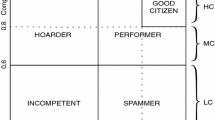Abstract
In this paper, a second-order adaptive self-modelling network model is introduced to model collective emotional response during frequent repetitive reward-based gaming. The model makes use of organizational learning using sharing individual learning experiences over shared gaming experiences. Simulation showed relevant prediction of skill building affected by emotional responses and context factors concerning communication and listening. The dynamics of the model were verified and validated through mathematical verification and parameter tuning, resulting in a computational model with a potential of being a successful cornerstone for frequent repetitive reward-based gaming-related research.
Access this chapter
Tax calculation will be finalised at checkout
Purchases are for personal use only
Similar content being viewed by others
References
Argyris C (1992) Overcoming organizational defences. J Qual Participation 15:26–31
Boateng R (2011) Do organizations learn when employees learn: the link between individual and organizational learning. Dev Learn Org: Int J 25(6):6–9
Canbaloğlu G, Treur J, Roelofsma PHMP (2022) Computational modeling of organisational learning by self-modeling networks. Cogn Syst Res J
Canbaloğlu G, Treur J, Roelofsma PHMP (2022) An adaptive self-modeling network model for multilevel organisational learning. In: Proceedings ICICT'22. Lecture notes in networks and systems. Springer Nature
Canbaloğlu G, Treur J, Wiewiora A (2022) Computational modeling of multilevel organisational learning: from conceptual to computational mechanisms. In: Proceedings of computational intelligence: Automate your world. The second international conference on information technology, InCITe'22. Lecture notes in electrical engineering. Springer Nature
Crossan MM, Lane HW, White RE (1999) An organizational learning framework: from intuition to institution. Acad Manag Rev 24(3):522–537
Ellis S, Shpielberg N (2003) Organizational learning mechanisms and managers’ perceived uncertainty. Hum Relat 56(10):1233–1254
Kim DH (1993) The link between individual and organizational learning. Sloan Manage Rev 35:37–50
Levitt B, March JG (1988) Organizational learning. Ann Rev Sociol 14:319–338
Rooney D, McKenna B, Barker JR (2011) History of ideas in management communication quarterly. Manag Comm Q 25(4):583–611
Treur J (2019) A modeling environment for reified temporal-causal networks: modeling plasticity and metaplasticity in cognitive agent models. In: International conference on principles and practice of multi-agent systems, PRIMA’19. Springer, Berlin, pp 487–495
Treur J (2020) Network-oriented modeling for adaptive networks: designing higher-order adaptive biological, mental and social network models. Springer Nature
Wang CL, Ahmed PK (2003) Organisational learning: a critical review. Learn Organ 10(1):8–17. https://doi.org/10.1108/09696470310457469
Wiewiora A, Smidt M, Chang A (2019) The ‘how’ of multilevel learning dynamics: a systematic literature review exploring how mechanisms bridge learning between individuals, teams/projects and the organization. Eur Manag Rev 16(1):93–115
Yamamori K, Isoda T, Hiromori T, Oxford RL (2003) Using cluster analysis to uncover L2 learner differences in strategy use, will to learn, and achievement over time
Yew-Jin L, Wolff-Michael R (2007) The individual| collective dialectic in the learning Organization. Learn Organ 14:92–107
Zhang J, Brackbill D, Yang S, Centola D (2015) Efficacy and causal mechanism of an online social media intervention to increase physical activity: results of a randomized controlled trial. Prevent Med Rep 2:651–657
Author information
Authors and Affiliations
Corresponding author
Editor information
Editors and Affiliations
Rights and permissions
Copyright information
© 2023 The Author(s), under exclusive license to Springer Nature Singapore Pte Ltd.
About this paper
Cite this paper
Thavaganeshan, H., Wu, J., Treur, J. (2023). A Second-Order Adaptive Network Model for Collective Emotional Response During Reward-Based Gaming. In: Yang, XS., Sherratt, S., Dey, N., Joshi, A. (eds) Proceedings of Seventh International Congress on Information and Communication Technology. Lecture Notes in Networks and Systems, vol 465. Springer, Singapore. https://doi.org/10.1007/978-981-19-2397-5_28
Download citation
DOI: https://doi.org/10.1007/978-981-19-2397-5_28
Published:
Publisher Name: Springer, Singapore
Print ISBN: 978-981-19-2396-8
Online ISBN: 978-981-19-2397-5
eBook Packages: EngineeringEngineering (R0)




